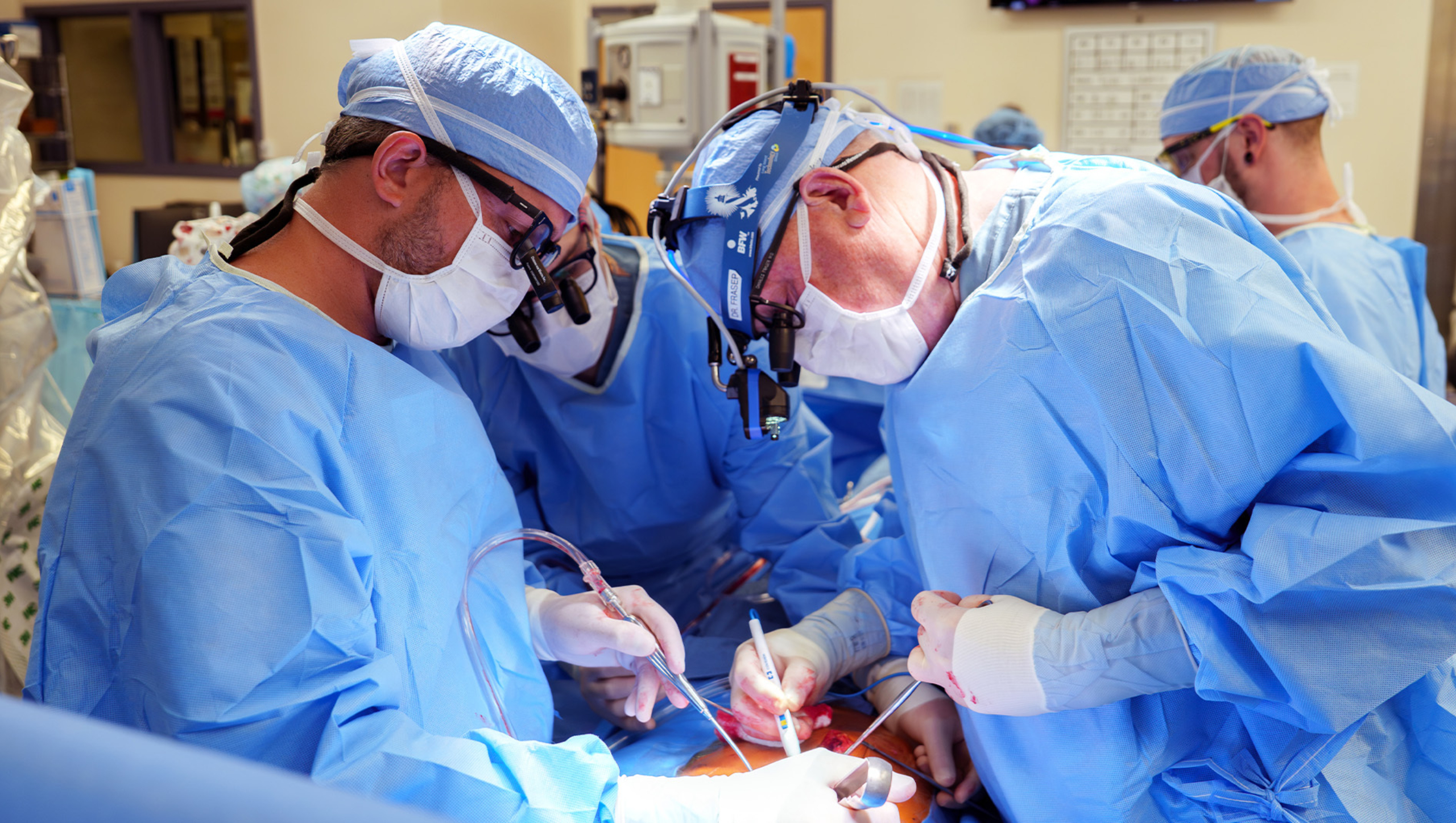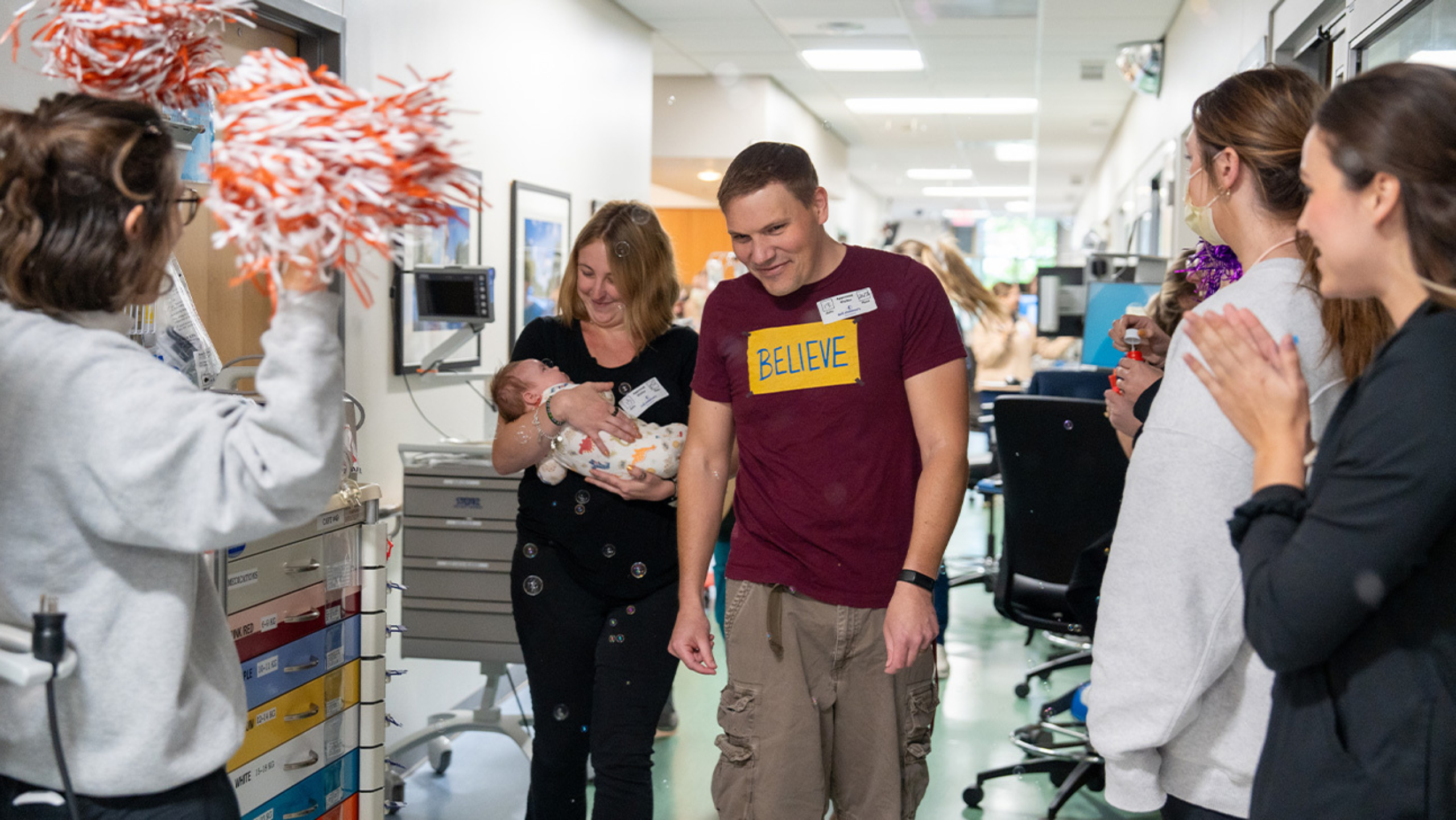From unranked to No. 10 in the nation in seven years, the Texas Center for Pediatric and Congenital Heart Disease is redefining what’s possible — a proof point for UT’s vision for an integrated academic health system that brings to life breakthroughs once unimaginable in Central Texas.

In the latest U.S. News & World Report rankings, the Texas Center for Pediatric and Congenital Heart Disease is No. 10 in the nation.
William was less than a day old when, after a prenatal diagnosis of severe heart failure, he became the youngest patient in the world to receive a Berlin Heart. The lifesaving mechanical device would keep him alive until a donor heart could be found. The surgery was unprecedented — and just a few years ago, unimaginable in Austin.
“There are only a handful of places in the world where a case like William’s could even be considered,” says Charles D. Fraser Jr., M.D., Raymond Family Chair in Cardiovascular Health at Dell Medical School and chief of pediatric and congenital heart surgery at the Texas Center for Pediatric and Congenital Heart Disease, established at Dell Children’s Medical Center in 2018. “That we could do it here, in Austin, is a testament to what academic medicine makes possible.”
What’s happening at the center is more than the growth of a heart program now ranked No. 10 in the nation by U.S. News & World Report — a meteoric rise from unranked in 2022. It’s the realization of a bigger vision: how one community’s investment in a medical school catalyzed a greenfield opportunity for a new, integrated academic health system attached to one of the world’s top public research universities.
A New Standard Arrives
The progress, which includes six other specialty programs at Dell Children’s whose rankings have climbed since the establishment of Dell Med, isn’t coincidental. It’s the product of a deliberate investment in academic medicine, where research, education and world-class care converge to produce the most advanced care possible for patients.
“The opportunity to build a program here in Austin was unprecedented,” Fraser says. “The exciting development of a novel medical school at the University of Texas was the reason I and many others are choosing to come here. The strength of the UT System presents almost limitless collaborative research and educational opportunities, creating powerful platforms to take on tough problems.”

William and his parents celebrate the successful procedure at Dell Children’s.
Consider William again: In many hospitals, a surgery of that complexity would mandate transferring the baby to another city. But here, because the program was built as part of an emerging academic health system, the team already included leading experts who wrote the book on complex cardiac procedures. Fraser himself was the national principal investigator for the multicenter trial that led to the Berlin Heart device receiving Food and Drug Administration approval — the only trial ever conducted in pediatric heart failure.
Turning Austin Into a Hub for Pediatric Heart Care
The Texas Center for Pediatric and Congenital Heart Disease is still young, founded in 2018. And yet in just a few short years, it has grown into one of the nation’s premier programs for congenital cardiac care.
Across the country, less than 10% of congenital heart surgery programs earn a three-star rating from the Society of Thoracic Surgeons — a distinction the center achieved in just five years. Pediatric heart transplant programs typically take decades to build to national prominence, and even among long-established centers, few have the capacity to perform groundbreaking procedures.
“What we’re building here is unlike anything else in Texas, in part because we’re leveraging the talent and strength of the state’s top public university,” says Z. Leah Harris, M.D., physician-in-chief at Dell Children’s Medical Center and chair of the Department of Pediatrics at Dell Med. “Our faculty don’t just care for patients — they teach, they innovate, they train the next generation of pediatric leaders. It’s a learning health system that improves with every case and gives every child the benefit of not just one doctor, but an entire academic community.”
The program’s outcomes speak for themselves: Mortality rates have dropped well below national benchmarks, even as surgical volume and complexity have grown since the program’s founding. The team now regularly treats patients who were turned away elsewhere, including those requiring first-in-state pediatric procedures such as partial heart transplant. In 2023, doctors at Dell Children’s performed one — just the seventh of its kind ever completed worldwide.
Defining the Future, One Patient at a Time
For years, Austin has been the largest U.S. city without an academic medical center. Families in Central Texas routinely had to travel to Houston, Dallas or beyond for complex care, with as many as 1 in 4 Austinites still leaving the region for serious medical needs.
As rankings rise and recognition grows, the pediatric heart program’s trajectory reflects more than individual achievement. It points to what an academic medical center anchored by Dell Med will become: a new kind of health system for the region, and a national model for what’s possible when research, education and care are unified by a shared purpose, accelerated by tech and innovation at a Tier 1 research university.
“The vision here isn’t just to be excellent today — it’s to build a system that will continue to push the goalpost for excellence,” says George Arnaoutakis, M.D., associate professor at Dell Med and himself a pioneer of adult cardiac care. Arnaoutakis, recruited in 2023, directs thoracic aortic surgery and cardiovascular surgery quality and outcomes and is surgical director of the transcatheter valve program at the Institute for Cardiovascular Health — the adult counterpart to the Texas Center for Pediatric and Congenital Heart Disease. “The digitally enabled health system we’re building, designed to support care possibilities we haven’t even imagined yet, will deliver world-class, tech-driven solutions that bring patients what they need most: hope and healing.”